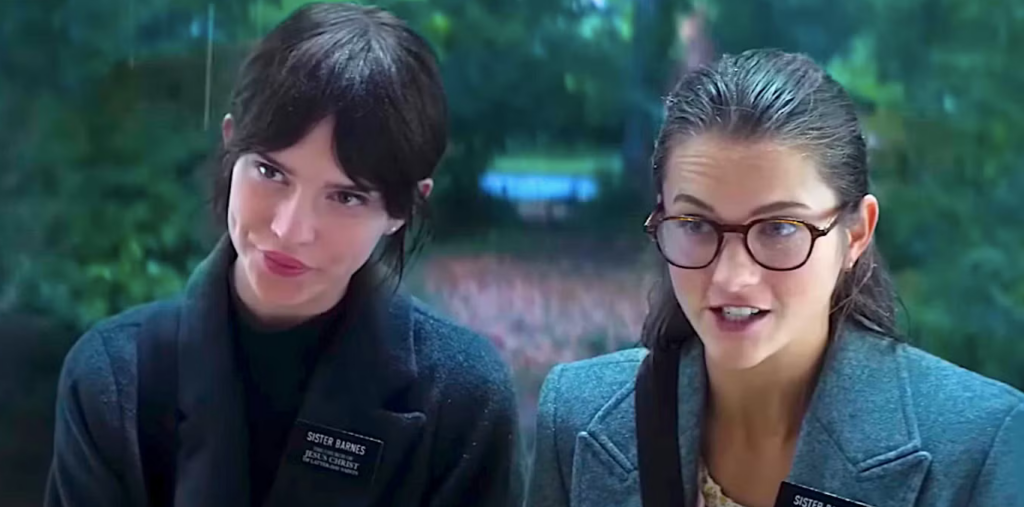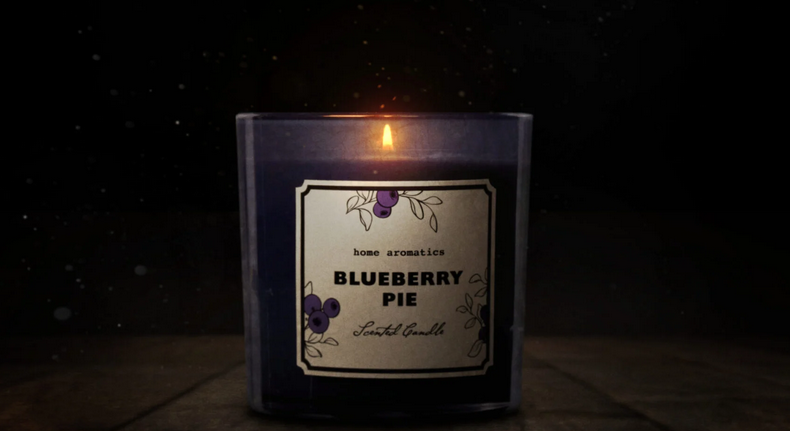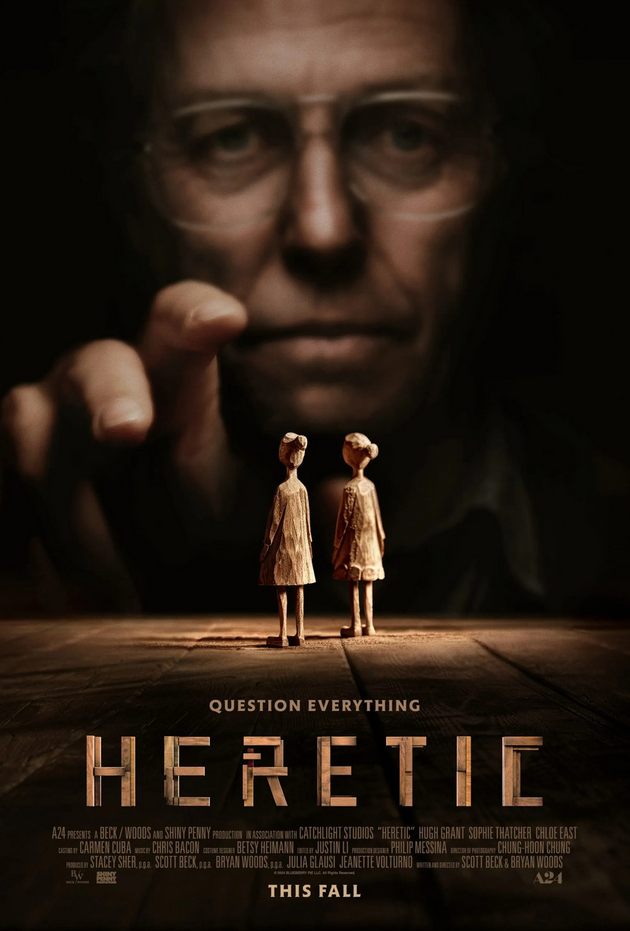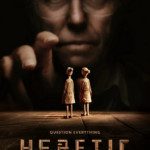Heretic (2024)
Directed By: Scott Beck and Bryan Woods
Written By: Scott Beck and Bryan Woods
Starring: Sophie Thatcher, Chloe East, Hugh Grant
Is all religious horror created equally? Heretic takes aim at an oft-mocked but rarely-explored corner of American religion: The Church of Jesus Christ of Latter-Day Saints. Spoilers beyond!
Perhaps it’s cheating for a post-Mormon to review Heretic. It might seem like softball for me–someone Latter-Day Saint church members might refer to as an apostate–to offer opinion on a film that has, naturally, drawn LDS ire. But I wasn’t excited to see Heretic because I enjoy seeing the church attacked. Instead, I wanted to know whether this film was interested in what I’m interested in: the nature of LDS theological fear, and how it differs from Catholic or Protestant fear.

“Two sister missionaries knock on the wrong door” is likely the intro to any number of post-Book of Mormon pornos. In this case, it’s neither punchline nor O-faces as Sister Barnes (budding scream queen Sophie Thatcher of Yellowjackets) and Sister Paxton (Chloe East, The Fabelmans) find themselves mired in a high-stakes game of theological Monopoly with the idiosyncratic Mr. Reed (an against-type Hugh Grant).
Heretic‘s is a canny set-up; material and cultural fears that LDS missionaries face, including conversion rates and debate-me intellectuals, provide background for the missionaries’ initial willingness to engage Mr. Reed. At the same time, a number of alarm bells are set ringing for viewers familiar with, well, cult tactics. Mr. Reed tests the women’s boundaries constantly, at first with volleys typical of those debate-me intellectuals, pieces of bait like the Word of Wisdom and the church’s history of polygamy.
The latter is low-hanging fruit that comes home to roost in the reveal that Mr. Reed wasn’t quite lying when he said his wife was home. As Barnes and Paxton are drawn further into Mr. Reed’s web, the stakes that seemed high–bringing home a baptism–shift into truly soul-shaking ones. Heretic is a haunted house movie, wherein Mr. Reed’s house is revealed as an endlessly-unfolding rat maze of horrors, dripping with occult ephemera and gestures to the plurality of the world’s faiths. There’s a particular motif of keys, from the window in Mr. Reed’s front door to the bicycle key that would broker the missionaries’ escape, calling to the Keys of the Kingdom and the Key of Solomon. This esoteric set dressing includes pews and statues, a table that might be used for LDS sacrament, countless books, and room after room of mysterious paintings, artifacts, and symbols.
For viewers familiar with American new religious movements, the house might call to mind the LDS church’s founder. Even Sister Paxton, Chloe East‘s bright-eyed naïf, senses a hook with which to draw in the seeking Mr. Reed. Joseph Smith also investigated many religions, she reminds him. Those familiar viewers know, too, the milieu in which Joseph’s church arose. The credulity with which he experimented with clairvoyance and dowsing. His interest in Egyptian artifacts. His ultimate certainty at having brought forth, at last, the restored gospel. Through this echo, Mr. Reed begins to take on a tinge not of the militantly anti-religious, but of the fanatically faithful.
The one true religion is control, Sister Paxton says, a dutiful student to Mr. Reed’s exacting school-master. A method within high-control settings is to establish an in-group of those within the belief system, and then norms for how the in-group interacts with everyone else: an accepted narrative of struggle, an expectation of ostracism, mockery, and abuse. Yet the further atomization of the in-group’s members is necessary to maintain control. Missionary pairs are to remain pairs (as referenced in the Polygon article linked above) partly for safety in numbers, but mostly as co-surveillants. I saw myself in Sisters Paxton and Barnes, although I never served a mission (it was expected I would, code for “that girl isn’t marriage material”). “Every member a missionary” is a refrain faithfully echoed by Saints the world over, and from a young age I knew I was expected to conduct myself in the world as an example.
At the same time, I knew if I tried to spread Christ’s word, I would be met with rejection or even harm. This defensive crouch stems from the church’s early history, a pattern of settlement, proselytizing, and upheaval that drove Mormons from western New York to what would become Utah. Despite the assimilation of their utopian experiment into mainstream US society, and despite their incredible institutional wealth, the shadow of old persecution defines the church’s culture and its relationship to the world.
It’s a positioning that, for some extremist members, can result only in End Times scenarios. Sisters Paxton and Barnes arrive at their investigator’s house armed with booklets and testimonies, expecting resistance. Instead, they encounter the logical end-point of conspiratorial thinking and fundamentalist faith.

From an LDS perspective, the depiction of the sister missionaries’ belief and actions is practically unimpeachable. If the hit watchdogs of the faith have cause to holler, it might be because they sense themselves instead in the film’s villain, Mr. Reed. There are no real inaccuracies in his various speeches, which might be what brings LDS critics up short; an important part of every Mormon’s spiritual journey is reckoning with the church’s most infamous elements. The subjectivity of Mr. Reed’s conclusions is not a credible threat to any viewer with half a brain. Beck and Woods (A Quiet Place) might have drawn on famous atheist thinkers to inform Mr. Reed (and included, hilariously, a simulation-theory red herring), but that isn’t where the character’s threat lies.
Throughout the film, Grant‘s performance left me queasy–not due to Mr. Reed’s seeming attacks on religious faith, but his embodiment of men of faith. He begins with a slightly sheepish, borderline-folksy delivery; he segues into outright lecturing to position himself as authority; he concludes by–as Sister Barnes puts it–manipulating the women toward their own deaths. Every flavor of white masculine authority I’ve encountered, from humility-laden LDS prophets to bloviating philosophy professors of my undergrad career, is refracted through Mr. Reed.
Below his “thin rhetoric” lies the same toolkit used by powerful religious men in every faith in human history. If the film has commentary on the LDS specifically, it isn’t conducted through its Mormon characters. Instead, the most poisonous aspects of LDS faith and practice are turned on those characters not by a non-believer but by, perhaps, a super-believer. Although the film’s title is “heretic,” Mr. Reed could reasonably be read as an apostate–perhaps even that most damned of all souls, a son of perdition. A lifelong seeker of the core truth beyond all religions, his character carries shades of Melmoth the Traveler and the original murderer, Cain… and perhaps a nod to Mormons’ own wanderers, the Three Nephites.
“Even the Devil can quote scripture” is a common adage the LDS employ against former members and hostile normies alike. Mr. Reed is a grand example of the church’s worst nightmares, and it’s in this way that Heretic works most adroitly.
On its surface, in its most basic movements, the film is a Mormon horror film, a movie about what members are taught to fear; it’s a slice of missionary lore, the faith-building story RMs get to tell gullible teen congregants. Its deeper layers depict the abuses of power baked into LDS structures, the church’s elaborate systems of control, and the emotional wreckage it creates in both male and female members.
From his first boundary-testing gotcha, Mr. Reed expresses the norms taught to church youth, especially girls: you are the frog boiling in the pot. Your gift of discernment turns devilish if used against men of God. Your soul’s death will be one of a thousand tiny water-drops, eroding instinct and innate dignity in favor of conformity and obedience. Yes, I saw myself in Thatcher‘s Sister Barnes–child of a convert, savvier than her spiritual leaders would prefer–and I saw myself in East‘s Sister Paxton, shockingly naïve and quavering but not wavering in the face of unrighteous dominion.
A key point of the movie’s press tour has been that both actresses grew up in the church. Their lived experiences inform the film’s emotional connective tissue… because, if their experiences were anything like mine, they were not categorically bad. Ambivalence assists the tightrope Heretic walks, inviting viewers to think about the people that make up any church, and at what point group identity subsumes the personal.

Another beloved quote: “By their fruits ye shall know them,” and Mr. Reed’s fruits are poisonous indeed. There’s no Hell in Mormon belief, no pit of torments, not even a classical Devil. Instead, there’s Outer Darkness, the permanent removal from God’s presence, suffered by those who commit the unpardonable sin. LDS fear is cosmic fear. In its portrayal of a man so desperate for gnostic truth that he resorts to manipulation, imprisonment, and murder to find it, Heretic understands that.


